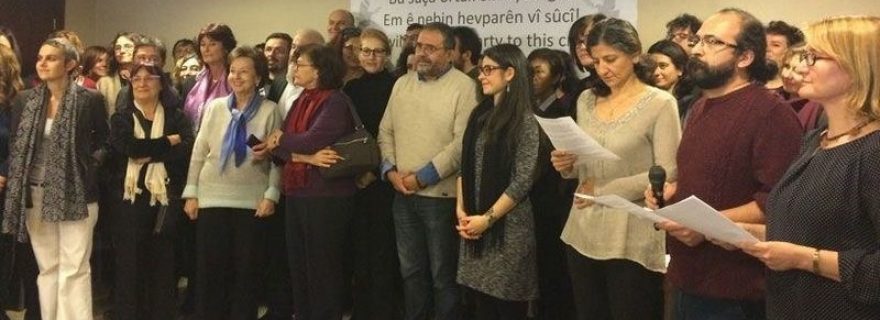Turkish Academics for Peace
Recently, ten Turkish academics who signed a petition in 2016 protesting against state violence towards the own population in South-East Turkey, have been cleared by Turkey’s Constitutional Court of charges of terrorist propaganda. What does this say about Turkey’s constitutional state?
In January 2016 they started a petition in which they protested against the use of violence by the Turkish state directed at their own citizens. During the renewed outbreak of the struggle against the Kurdistan Workers' Party (PKK), many civilians in cities in the South-Eastern part of Turkey suffered from abuses, lack of food and medical care, due to state-imposed curfews lasting for weeks. Many of the academics who signed the petition have been fired since, summoned to appear in court on the charge of terrorist propaganda, and some were actually imprisoned. A group of ten convicted signatories appealed to the Constitutional Court, the highest judiciary authority in Turkey. In July 2019, the court cleared them of the charges against them.
After years of peace negotiations, from 2012 onwards the hostilities between the Turkish army and the PKK increased again in 2015, just before the parliamentary elections of June 2015. Erdoğan hoped to win voters by creating an atmosphere of national emergence, giving him the opportunity to play the role of saviour of the nation.
In January 2016, Academics for Peace, an initiative started in 2012 by academics from fifty different Turkish universities started the petition ‘We will not be a party to this crime!’. They requested the government to put down their weapons and get back to the negotiation table. According to the signatories, the Turkish army violated Turkey’s national laws and human rights with their military operations in South-East Anatolia. More than 2000 Turkish academics signed the petition which was also supported by an additional 2215 foreign academics.
In reaction, Erdoğan accused the signatories of high treason. According to him, they were ‘pseudo-intellectuals’ making propaganda for a terrorist organisation. One of Erdoğan’s followers, a mob boss, threatened: “We will shower in their blood .” Scholars, especially those working at conservative state universities outside the urban regions were threatened by some of their pro-Erdoğan colleagues and lost their jobs. Erdoğan summoned all signatories to appear in court on the accusation of spreading propaganda for a terrorist organisation.
Subsequently, declarations of support were expressed by all layers of Turkish society. Academic institutions from abroad, including departments of Middle Eastern Studies, voiced their support as well. Some endorsed the message of the original petition, others protested against Erdoğan’s violation of the right to freedom of expression.
Nonetheless, many signatories have been fired, did not get their contracts renewed, or they were not considered for new positions. Several academics were not able to renew their passports, so they were unable to attend conferences abroad. Others, who were abroad at the time of the petition, cannot return to Turkey out of fear to be arrested or prosecuted.
So far, approximately 785 signatories have been taken to court. They have been charged with sentences varying from fifteen months up to three years in prison. They were given the option to postpone the execution of their verdict in case their sentence to imprisonment was less than two years. Upon obtaining this option, the verdict cannot be reconsidered provided that the convict does not commit the same offence within five years. Many accepted this postponement.
However, ten convicted signatories rejected postponement and appealed to the Constitutional Court. They were cleared in July 2019, reasoning that the text of the petition could not be considered terrorist propaganda and that the verdict had violated their right of freedom of expression.
Principally, Turkish law demands that the lower judge follows the verdict of the constitutional court, but unfortunately with the current biased position of the Turkish judiciary, this does not guarantee anything. In this case, however, it seems as if justice was served: meanwhile, 17 signatories whose trials were ongoing, are cleared. The cases that have already been closed and people who accepted the postponement, will probably not be acquitted right away. An extra procedure will be necessary. In addition, academics who lost their jobs will not easily return to their positions as they have been taken by others. It will take a long time before all rights will be restored.
Nevertheless, this acquittal can be considered a victory of justice, in a country where the president’s word is law. Perhaps, the justice done in the case of the Academics for Peace can be seen as the first spark of hope for a change in Turkey’s constitutional state.



0 Comments